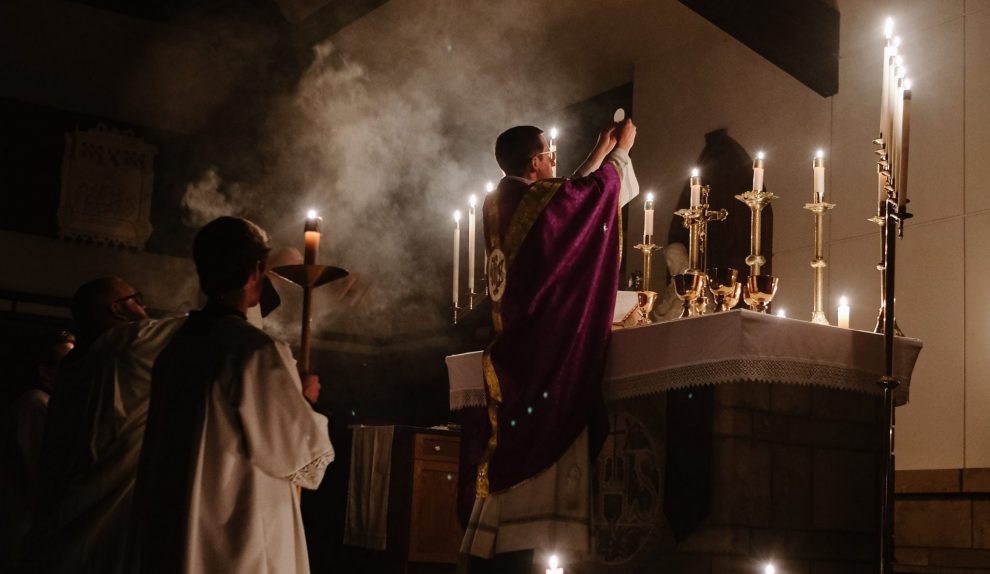Corresponding Reader Survey: Catholics explain the heart of what they believe
The first time I attended Mass was on a lunch break at my Protestant seminary. I was working on a master’s degree in pastoral studies in Portland, Oregon and had begun a long-distance relationship with a childhood friend who was a cradle Catholic. Sneaking away from campus between classes, I walked into the small chapel at the Grotto. I wanted to glimpse this man’s faith to determine whether we were compatible.
How can I explain what I found there at that lunchtime Mass? The quiet I had not heard in such a long time—or maybe ever. I witnessed tenderness between the handful of people who were there that dusky fall day. Each was at least 50 years older than me. I saw an intimacy that comes with praying together, but it was more than that. I felt the connection they had, not only to each other but also to a sacred history I could not yet name. I remember how cold I felt. I could not keep myself from shaking. I feel this chill now as I remember that day. I know now that it is, as it was then, the presence of the Holy Spirit.
I kept returning on my lunch breaks, on weekend visits with my boyfriend, and on holy days. Each time I was armed with questions and defenses of why I shouldn’t be there. But the answer kept returning: God is here.
I don’t want to disparage my Protestant roots, especially as #Exvangelical seems to be the trend these days. Protestants are my brothers and sisters in Christ. I love them dearly. This background gave me a firm biblical foundation—strong enough to be able to point out to my now fellow Catholics that they do in fact know their Bible, they just can’t tell you the book and chapter to find the verse in. This foundation is strong enough that I realize I still don’t know anything.
I continued attending Mass (even without being able to take the Eucharist), graduated from seminary, and married the man (in a Catholic Mass). Yet it took six years from that first Mass at the Grotto until I finally converted. Oddly, what held me back is the very thing I now hold onto and what keeps me Catholic—real presence.
I wasn’t certain I could believe in real presence or transubstantiation, that the bread and wine actually become the body and blood of Christ during the Eucharist. It turns out I am not alone. In a Pew survey last year, only one third of Catholics believe in real presence.
Real presence is what makes my life as a Catholic different from the years I spent in Protestantism, where bread and wine are symbols. Bread and wine are taken in remembrance and to look forward, but not revered in the mystical moment of now.
I understand now, after more than a decade in the church, that this is the mystery of our faith—the very words spoken during Mass to remind us. Real presence is the very core, crux, and heart of this faith.
When I receive the Eucharist, Christ is present. I connect to God and receive grace in that moment in a singular, particular way that is unique to me. I am in communion with God. The “restless heart” that St. Augustine speaks of is held still for one quiet moment.
As if this wasn’t the most magnificent moment in my life (and I get to experience it every week, every day if I want to), it is even more expansive. In the moment of the Eucharist, I also connect to and am in communion with my fellow parishioners. Some I have celebrated and grieved with over the years. Others I do not know by name but know their presence, their routine as they arrive at Mass, and the red sweater they always wear for Pentecost. In the moment of the Eucharist, I connect to them in a more qualitative way than when we walked through the doors of the church.
There is also a connection to the church as a whole. I pray with the grandmother whispering over candles in a small village church in Italy, with the families in China living under persecution, and with the Nigerian seminarian moments before he was martyred.
There is a sense in which the Eucharist is timeless, out of time, eternal, or, as I recently read, a panorama of salvation history. We look to the past, remembering Christ’s resurrection. We look at the present, our relationship with him now. We look to the future, his second coming. As we look back in this moment, we also connect to the faithful who have come before us: the apostles, saints, and our eighth-grade math teacher who prayed over the class roster.
As we look forward into the future, we see Christ’s second coming, the feast of the marriage supper of the lamb. We see when all creation will be reconciled, when all will be made new, when sin no longer separates us from experiencing God fully. Our existence will not be this glimpse of heaven but will be heaven.
Everything about being Catholic is centered on this one moment when we experience the real presence in the Eucharist. When Christ is present in the Eucharist, I connect to God, my church, and the entire panorama of salvation in a more qualitative way than I do the rest of the week. The ache I feel in the rest of my life—for God, for connection, for community, for cleanness, for wholeness—vanishes in one single moment. It is a flash, and I’ll miss it if I’m not present.
I now know what I found at that lunchtime Mass more than 20 years ago. I could not yet experience it fully and still have only had a taste. Real presence. God is here. This is home.
Image: Josh Applegate on Unsplash















Add comment